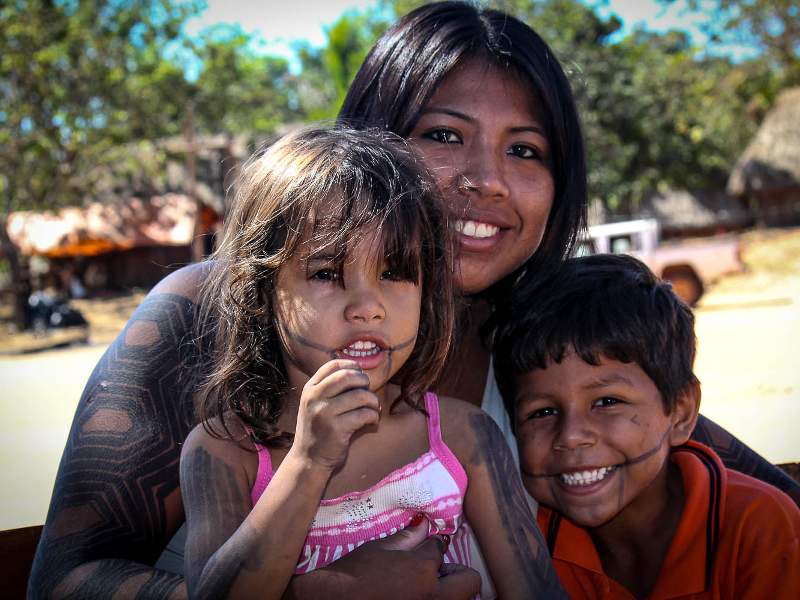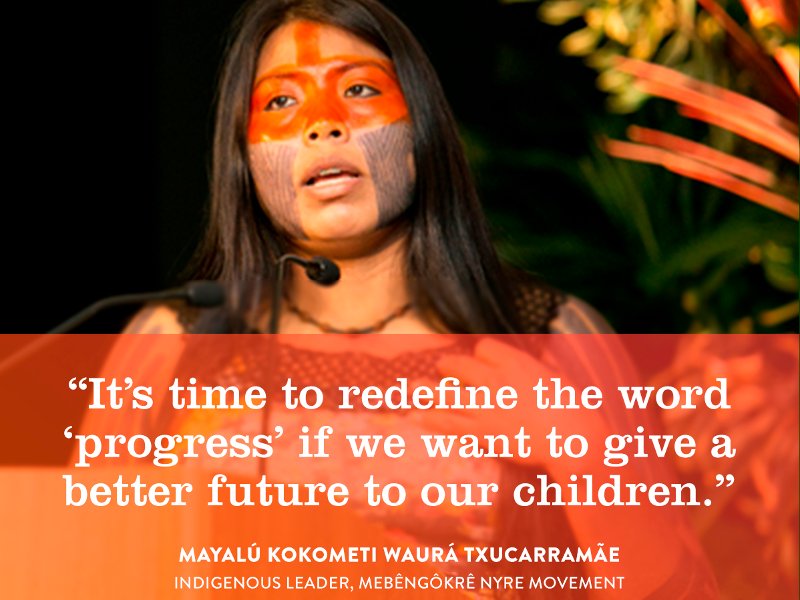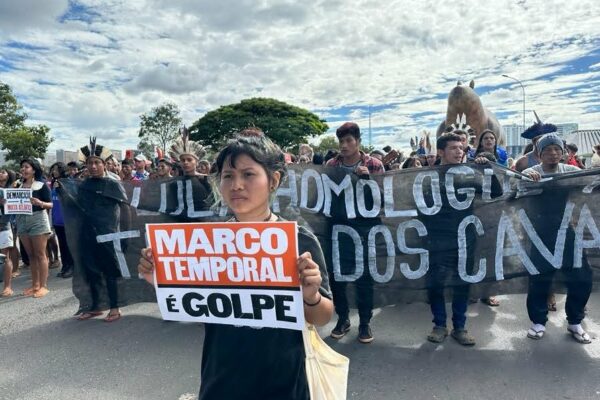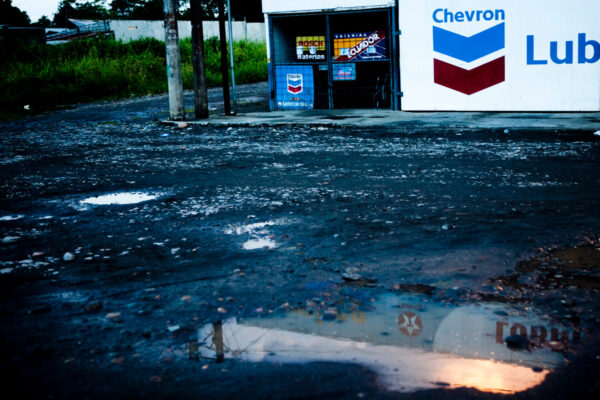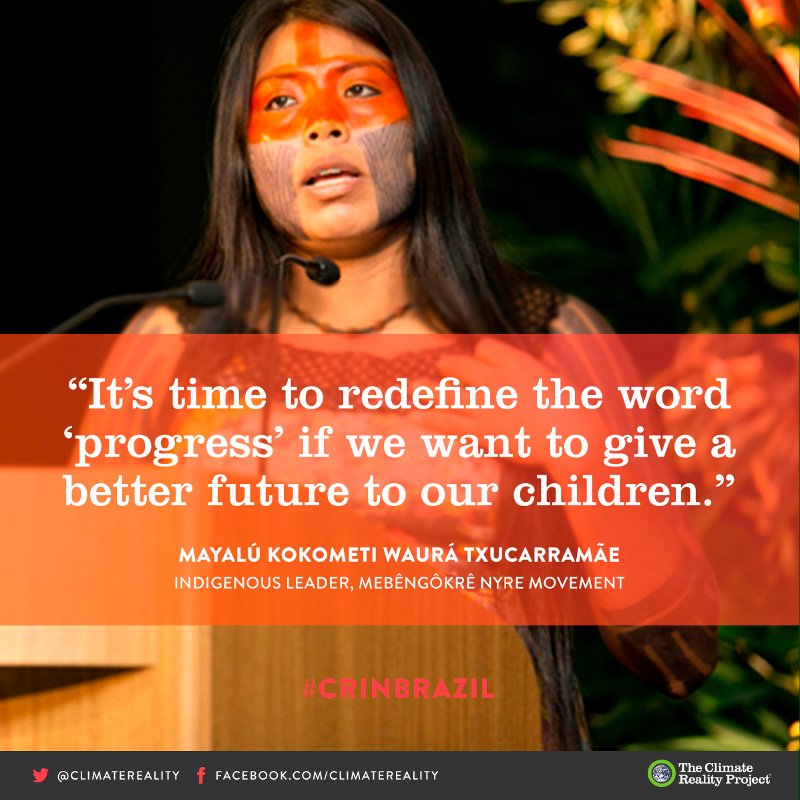
Translated and adapted from an original article in Portuguese published by Eco Reserva
Earlier this month during a wildly successful training of Climate Leaders conducted by former US Vice President, Nobel Laureate and Chairman of the Climate Reality Project Al Gore in Rio de Janeiro, Brazil, Mayalú Kokometi Waura Txucarramãe – daughter of Chief Megaron and adopted granddaughter of legendary Kayapó Chief Raoni – received a standing ovation after her emotional and inspiring speech to more than 700 participants.
Mayalú, who is of Kayapó and Waura ethnic origins, lives on the banks of the Xingu River in the heart of the Brazilian Amazon. She spoke about her origins, about her people, about the importance of demarcation of indigenous land as a mechanism to reduce the impacts of climate change. She spoke about deforestation and dams and about responsibility, calling for all in the room to be brave and to take immediate action against these threats to her lands and to our global climate.
“The Xingu Indigenous Park is the largest demarcated indigenous territory in the world. It’s where I spent my childhood and it was where I learned the meaning of preserving nature and how to respect everything that is in it. All of us kids played together in the village, in the river, in the trees, and we picked native fruits for food. Today, the Park is virtually an island of green surrounded by a sea of deforestation.”
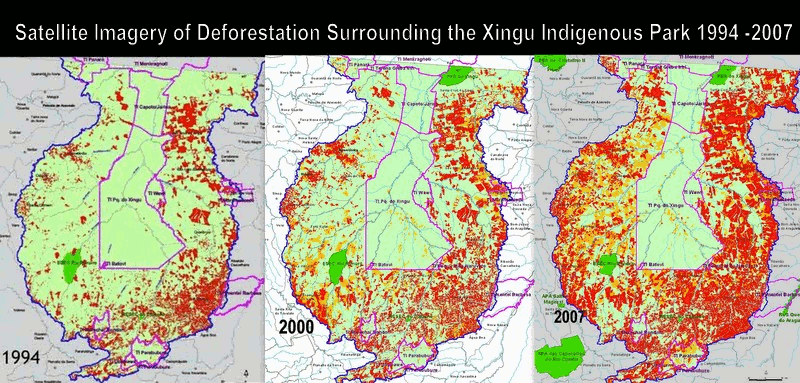
Mayalú pointed to a map which showed that this year, in contrast to the lower deforestation rates in recent years, there was a significant increase of 191% over the same period last year. In the state of Mato Grosso, where the park is located, the increase was a whopping 957%.
The data caused an uproar in the audience, who had just heard a somewhat superficial and disjointed speech from Brazil’s Minister of the Environment Izabella Teixeira.
“The government prefers not to admit this but the truth is obvious to me,” said Mayalú. “I live in that region, I do not need numbers to find this sad reality of the indifference of Brazil towards native people and the Amazon forest.”
“Deforestation is an issue of international importance because it is one of the causes of climate change, and that needs to be discussed and resolved. While we, as indigenous peoples, may not articulate these problems in scientific terms and categorize them as ‘climate change,’ we know their causes well. We also know that we can be part of the solutions, solutions that we have demonstrated over millennia by preserving and taking care of our Mother Earth. Our culture, our traditions, our beliefs depend on the land and we care for her; this is a major teaching we have received from our ancestors.”
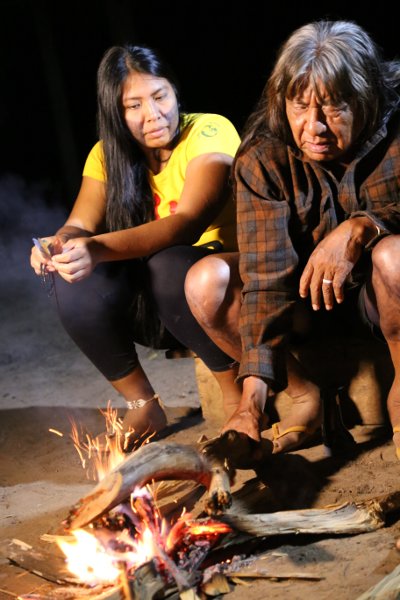
“Despite our fight to keep the earth in balance, to protect our territory and our traditions, today the white man has destroyed a huge amount. My grandfather said long ago that the uncontrolled action of man has unbalanced nature. Fish are dying because the rivers are drying up, and this has harmed forests too. The cycle of rainfall is not the same, which affects the plants and animals. This saddens me because my grandfather told me before he died that he was part of the land, part of the river, part of the forest. Then I see that nature is crying and it is as if my grandfather is crying…For me, caring for nature is caring of my ancestors, and also to provide for future generations.”
“I want to talk about Brazil because I am Brazilian and because I know that most of the Amazon rainforest is in Brazil. On the flag of Brazil are the words ‘order and progress.’ But Brazil has used the word ‘progress’ for the expansion of the extraction of oil, gold and iron ore, and to build large dams in the Amazon; and for the runaway expansion of agriculture and cattle ranching. I think we need to redefine the word ‘progress’ if we want to provide a decent future for our sons and daughters. This sacred forest, which is known as the heart of the planet because it regulates the cycles of rain for the entire continent, must be preserved. We need the forests to be living and we need the rivers to run free because these are the veins of our Mother Earth. There is no doubt that the Amazon is vital to solving the climate crisis, and for the preservation of mankind, because we are not something separate from the forest – we are a part of it.
“Today we are living through a key moment in history when we need to take action, and we need to take action now. The drought in São Paulo, for example, is not happening by chance. Even if no one is talking about it, this problem is directly connected to the destruction of the Amazon, where I live, because the standing forest regulates the cycle of rainfall. This is a clear example of how the destruction of the Amazon can affect the lives of you here in the big city.”
Mayalú passionately called on all present to be radical at this key point in time!
“Everything is connected: my life and my way of life, with your life and your way of life. This moment calls for courage, so I ask of you: be bold! Take radical initiatives on behalf of the preservation of nature and of the people who take care of nature. We are brave and have fought tirelessly for our rights, even without the resources we need, even with all the difficulties, even with all the disrespect that we have suffered. Our struggle is not only of today, it has been going on for more than 500 years. But recently it has become especially difficult for all the Kayapo, the Mundurukus, the Waura, the Araras, the Xikrin, the Guarani and so many other ethnic groups, who have been abused and threatened in their daily struggle for the demarcation of their lands, the most important right for our people. Indigenous peoples represent only 4% of the world’s population, but take care of 80% of the territories and biodiversity of the planet.”
Nearing the end of her speech, Mayalú reinforced once more the importance of the legal recognition of – and respect for – indigenous peoples and their lands as the most effective way to preserve the Amazon. “Indigenous land begins where deforestation ends, and vice versa. We know how to care for and preserve the earth.”
In closing, Mayalú reminded everyone of a historic moment this year, the People’s Climate March.
“This year, world leaders gathered in New York for an emergency climate summit of the United Nations, but I feel ashamed that our president did not sign the agreement in New York, claiming that Brazil was not consulted, when here in Brazil, so many projects go forward without consulting the people who are affected. From my point of view this is not good enough. We need leaders who do what they preach. For example, the claim that we should not invest in solar energy because it is very expensive must be changed. In today’s world, we need today’s solutions, and not the solutions from the last century, such as dams or coal plants. Either we invest in solutions, or it will be too late and there will be no solution. Over 500,000 people marched around the world, demanding action on climate change. It was beautiful! It was an act of love and respect for the earth, and that gave me hope for better days ahead. We need more! We need to take action worldwide, led by rulers who will drive real change. We have no more time left, no time for a superficial and irresponsible discourse that excludes our responsibility as mankind. We want more investment in renewable and truly clean energy rather than dams, which have killed our rivers, which have ignored our rights and the rights of Mother Earth. Dams such as those on the Madeira River, the Belo Monte on the Xingu, the São Luiz do Jatobá on the Tapajós River or the dozens of other dams planned for the Amazon region. Enough! A truly clean energy future means more jobs, better jobs, more empowered communities involved in the process and taking part, and, of course, properly consulted, as is required by the law.
“We need to change the course of our history and build a future together that is prosperous, healthy, preserved, balanced and clean so that our sons and daughters can live in peace and harmony as they deserve. The slogan should be one of respect: respect for Mother Earth and for ourselves, the children of this earth. Do not lose hope, because even if we cannot change the past, we can write a different future.”
